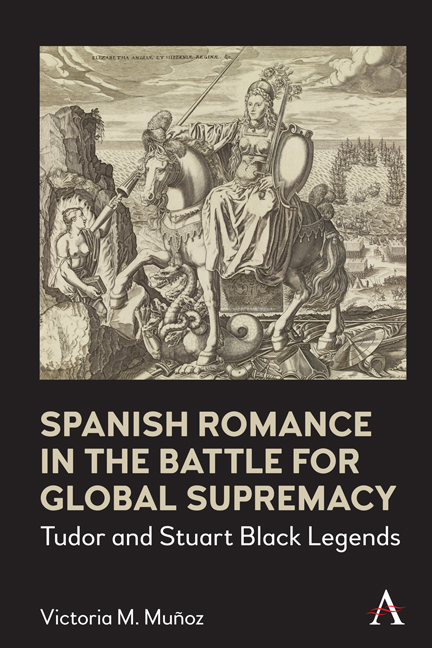Book contents
- Frontmatter
- Contents
- List of Figures
- Acknowledgments
- Prologue: Translating Romance, Empire, and Spain
- Chapter One “Books of the Brave” English: Spanish Tales of Love and Arms in Translation
- Chapter Two Dream Visions and Competing Dreams: Rewriting the Spanish Model in America
- Chapter Three Sun Kings and Moon Queens: The Courting and Uncourting of Spain
- Chapter Four Signs of England: Redcrosse Crosses the Ancient Boundary
- Chapter Five Believing Bottom’s Dream: Rationalizing Exploration from America to Australia
- Chapter Six Unruly Readers: Anti-Spanish Sentiment and the Feminizing of Romance
- Epilogue: Spanish Literature in England before Don Quixote
- Appendix I English Readership of Spanish Romance, By the Numbers
- Selected Bibliography
- Index
Chapter One - “Books of the Brave” English: Spanish Tales of Love and Arms in Translation
Published online by Cambridge University Press: 22 February 2022
- Frontmatter
- Contents
- List of Figures
- Acknowledgments
- Prologue: Translating Romance, Empire, and Spain
- Chapter One “Books of the Brave” English: Spanish Tales of Love and Arms in Translation
- Chapter Two Dream Visions and Competing Dreams: Rewriting the Spanish Model in America
- Chapter Three Sun Kings and Moon Queens: The Courting and Uncourting of Spain
- Chapter Four Signs of England: Redcrosse Crosses the Ancient Boundary
- Chapter Five Believing Bottom’s Dream: Rationalizing Exploration from America to Australia
- Chapter Six Unruly Readers: Anti-Spanish Sentiment and the Feminizing of Romance
- Epilogue: Spanish Literature in England before Don Quixote
- Appendix I English Readership of Spanish Romance, By the Numbers
- Selected Bibliography
- Index
Summary
The books of Amadís de Gaula and Espejo de príncipes y cavalleros came to England in the garb of military and rhetorical guidebooks. With an uptick in translation during the late 1500s, English culture developed a proverbial obsession with reading the books of the brave Spanish and Portuguese conquistadors, particularly during the war years of 1585 to 1604, when English men-at-arms prepared to meet Spaniards in battle. This was to be a hinge period in the conception of an English conquest fantasy, planting the seeds of England's aspirational imperialism, in and through romance.
Tales of Love and Arms
Ramón Llull's Català guidebook, The Book of the Order of Chivalry (1484), may not have been a fictional romance, but it certainly spoke of love and arms. It was, most fittingly, the first vernacular work of Iberia to be printed in English, the first in a developing series of translations that culminated with the period of most concentrated translation of Spanish romance during the Anglo-Spanish War (see Appendix I). In his youth, Llull had been a knight, seneschal, and courtier at the courts of James I, King of Aragón (1208–1276; ruled 1213–76) and of his second son, King James II (1267–1327; King of Aragón from 1291–1327; King of Mallorca/Majorca from 1276–87 and 1295–1311). In the year 1263 at the royal court of Mallorca, Llull experienced a series of religious visions that enacted a major personal conversion, after which he turned to more exegetical and theoretical writings. Composed early in his career, The Book of the Order of Chivalry offered a didactic guidebook for inductees to the order of knighthood, typically men of noble birth who had closely served the king. Llull traced the origins of knighthood to the Creation, and he set down a set of virtues that bolstered the knight's crusading spirit, for “if you wish to find nobility of courage, seek it in faith, hope, charity, justice, fortitude, loyalty and the other virtues, for nobility of courage resides in them, and because of them the noble heart of the knight protects itself against evil, deceit and the enemies of Chivalry.”
- Type
- Chapter
- Information
- Spanish Romance in the Battle for Global SupremacyTudor and Stuart Black Legends, pp. 11 - 38Publisher: Anthem PressPrint publication year: 2021



